
4 minute read
Editorial
Accounting for the price of carbon
CARBON is the common element of all known life on earth.
It’s also the common element in every disagreement over earth’s future.
Or so it seems, these days.
As a species, we’re changing the climate, quickly, and now we’re taking steps to rectify that.
But here, those efforts to balance carbon emissions with carbon capture are having profound effects on families, communities and our primary sector.
These land-use changes have happened before but our most recent transformation, from sheep and beef to dairy, tended to involve farm owners staying in charge and staying in profit.
What is clear is that the world is only headed in one direction and while the clean transition will be a bumpy ride, it will happen.
The free market will reward those who develop sustainable tools and strategies and who emit less.
Our primary sector could, perversely, sustain collateral damage despite being the poster child for efficient protein production.
The solution is to take stock of what’s important to us.
There are many ways to reach our targets and we must implement a plan that reflects our unique nation.
There are not many developed countries in the world that rely so heavily on food production to make their living.
As it stands the market is rewarding the replacement of that food production with trees.
Capturing carbon is important, but surely we can do that while sustaining our farming sector and meeting our emissions targets.
To do that, the market needs checks in place to protect what we hold dear.
And we need to relearn a lesson from the past – that evolution has always been a part of farming and those that adapt quickest will reap the benefits.
Enabling that evolution to occur in a way that reflects our values is the challenge right now.
Bryan Gibson
LETTERS Trusting the tried and tested
I WRITE in reference to Sue Edmonds contribution from the Pulpit on December 13.
It is time people understood that we are already amongst the most regenerative farmers in the world. We have soil carbon levels at world best, caused by 100 years of rotational grazing and use of legume-based pastures.
I have two scientist friends who have led successful ‘regenerative agriculture’ projects restoring depleted and overgrazed soils in Outer Mongolia and China. This was largely done by stopping overgrazing and starting rotational grazing systems using location specific legumes.
Just like we have done in New Zealand.
Some of the regenerative practices advocated by Edmonds and others will have profound effects.
Examples include using up to a dozen pasture species in a sward and grazing them, when they are like hay crops. We know that won’t sustain dairy production at current levels, and have a high probability of producing half the DM we currently do. The science has been done on this – and published.
Regeneralists also don’t like weed sprays or ‘chemical’ fertilisers. We know that low rates of specific herbicides are very effective. Stopping the use of them will see the hills covered in nodding thistles and ragwort, while the heavy soils will be covered in buttercup. This is inconsistent with the principles of kaitiakitanga and takes a heavy toll on labour and productivity. I have always regarded superphosphate as guano treated with sulphuric acid, to add sulphur and make the nutrients more plant available. It is not ‘evil’ and has made this country what it is today.
Edmonds can do what she likes on her one-hectare smallholding, and listen to as many overseas podcasts as possible.
Just don’t preach to us who farm for profit and sustainability.
John Dawson
Dairy farm owner, Marotiri
Methane taxes will starve people
WE MAY be able to stomach methane taxes, if the price of food doubles we will just eat less and be healthier for it, but poor people will starve to death.
Taxing their rice, dairy and meat will devastate them and they have no options to mitigate or avoid these essential foods.
While the rich continue to fill their tanks with high carbon fossil fuels, the poor will starve to death, due to methane taxes on their food.
Is this what we want?
Who will fight for the poor?
Dave Stanton
Geraldine
Letters to the Editor
Letters must be no more than 450 words and submitted on the condition The New Zealand Farmers Weekly has the right to, and license third parties to, reproduce in electronic form and communicate these letters. Letters may also be edited for space and legal reasons. Names, addresses and phone numbers must be included. Letters with pen names will generally not be considered for publication.
Farmers Weekly is published by GlobalHQ, PO Box 529, Feilding 4740. New Zealand Phone: 0800 85 25 80 Website: www.farmersweekly.co.nz EDITOR Bryan Gibson bryan.gibson@globalhq.co.nz EDITORIAL Carmelita Mentor-Fredericks editorial@globalhq.co.nz Neal Wallace neal.wallace@globalhq.co.nz Colin Williscroft 06 323 1519

03 474 9240
027 298 6127 colin.williscroft@globalhq.co.nz Annette Scott 021 908 400
annette.scott@globalhq.co.nz Hugh Stringleman 09 432 8594 hugh.stringleman@globalhq.co.nz Gerald Piddock 027 486 8346 gerald.piddock@globalhq.co.nz Richard Rennie 07 552 6176 richard.rennie@globalhq.co.nz Nigel Stirling 021 136 5570 nigel.g.stirling@gmail.com PUBLISHER Dean Williamson 027 323 9407 dean.williamson@globalhq.co.nz ADVERTISING Andy Whitson 027 626 2269 New Media & Business Development Lead andy.whitson@globalhq.co.nz Steve McLaren 027 205 1456 Auckland/Northland Partnership Manager steve.mclaren@globalhq.co.nz Jody Anderson 027 474 6094 Waikato/Bay of Plenty Partnership Manager jody.anderson@globalhq.co.nz Donna Hirst 027 474 6095 Lower North Island/international Partnership Manager donna.hirst@globalhq.co.nz Grant Marshall 027 887 5568 South Island and AgriHQ Partnership Manager grant.marshall@globalhq.co.nz Ella Holland 06 323 0761 Livestock Partnership Manager 027 602 4925 livestock@globalhq.co.nz ISSN 2463-6002 (Print) ISSN 2463-6010 (Online) Debbie Brown 06 323 0765 Noticeboard/Word Only/Primary Pathways classifi eds@globalhq.co.nz Grant Marshall 027 887 5568 Real Estate Partnership Manager realestate@globalhq.co.nz Andrea Mansfi eld 027 446 6002 Salesforce director andrea.mansfi eld@globalhq.co.nz
PRODUCTION Lana Kieselbach 027 739 4295
production@globalhq.co.nz Advertising material adcopy@globalhq.co.nz






